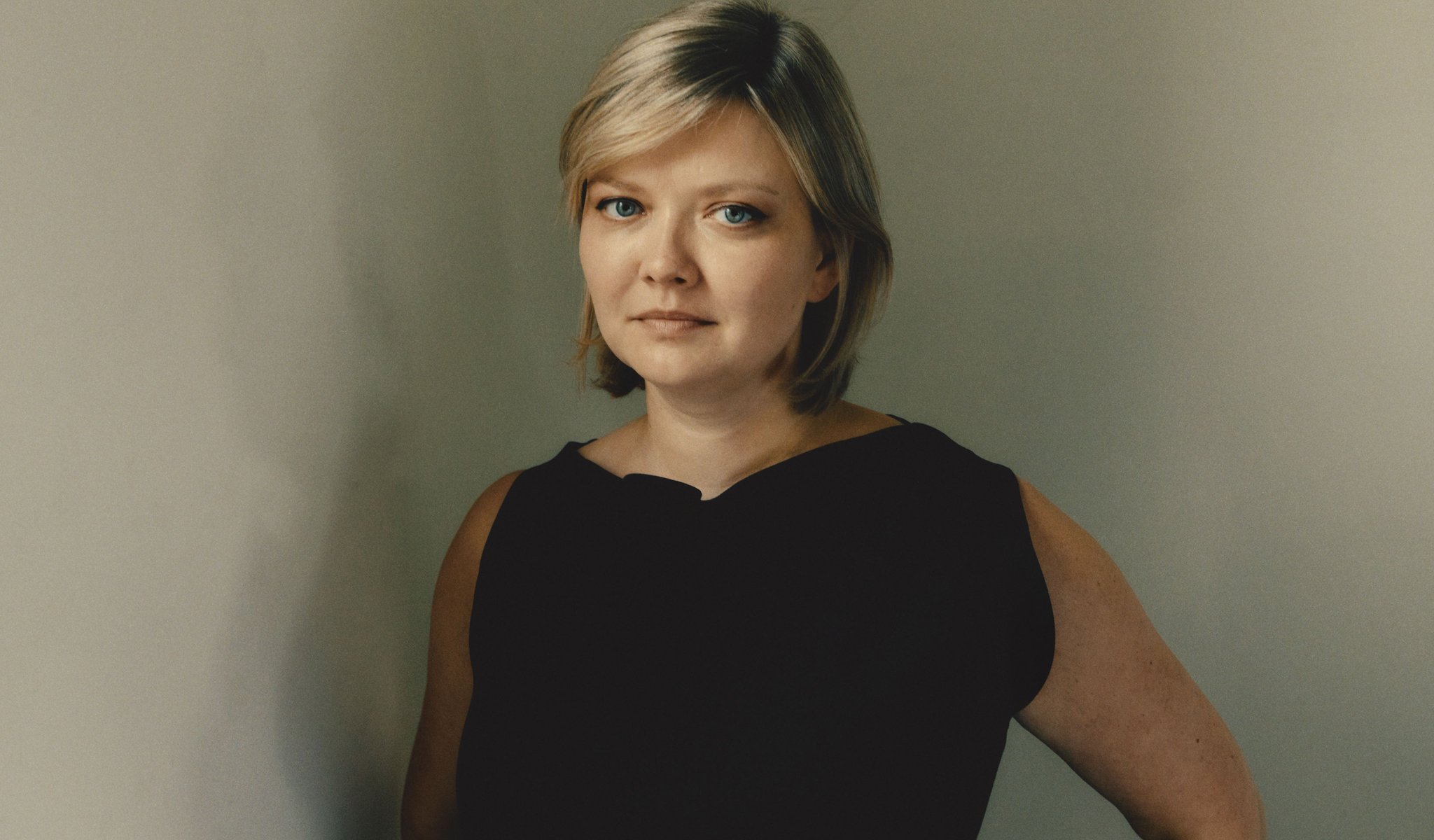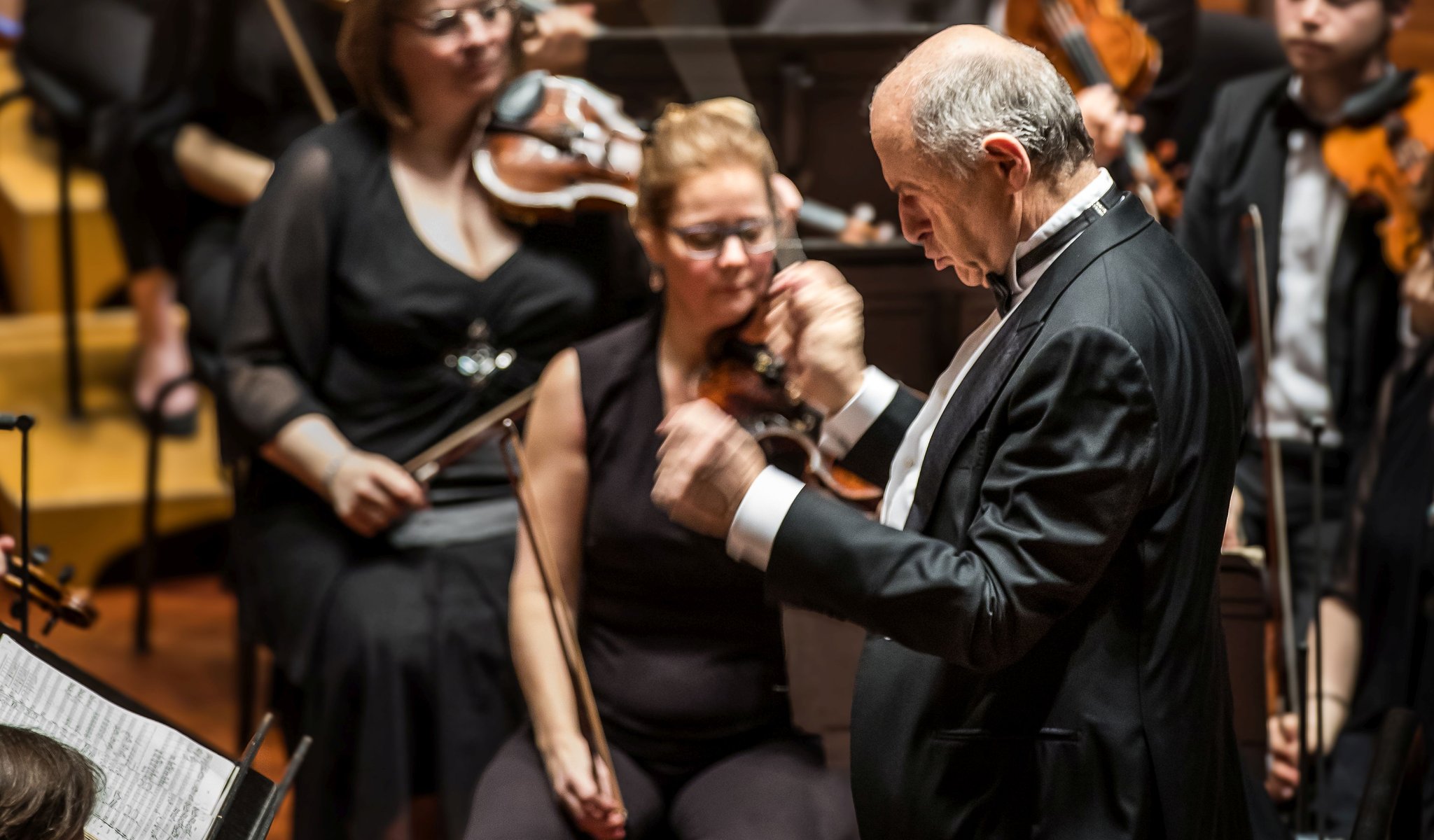

Orchestral concert: Beethoven, R. Strauss
Ibragimova, Fischer
Program
In memory of our dear colleague and friend Victor Aviat:
Johannes Brahms (→ bio)
Intermezzo in E-flat major, Op. 117, No. 1 (orchestrated by Victor Aviat)
Fanny Mendelssohn
Gartenlieder – Morgengruß , Op. 3, No. 4
Ludwig van Beethoven (→ bio)
Violin Concerto in D major, Op. 61
Interval
Richard Strauss (→ bio)
Josephslegende, Op. 63
Featuring
Other information
The event is about 2.5 hours long.
About the event
Two composers whose oeuvres span the boundaries of musical eras, a grandiose violin concerto and a monumental-sounding ballet are offered in the BFO’s program. However, the first notes of the concert will be played in a commemoration: Brahms’s lament seeking calm will be performed in the orchestration and in memory of Victor Aviat, principal oboist of the orchestra, who passed away in May. The intermezzo will be followed by a unique choral piece before Alina Ibragimova, who is equally at home on period and modern instruments, joins the orchestra as the soloist in Beethoven's only violin concerto. A reviewer in the Guardian praised her direct and honest performances. In 2022, Ibragimova played Prokofiev’s concerto with the Budapest Festival Orchestra, while this time, she will perform the “king of all violin concertos.” After the intermission, a curiosity, Richard Strauss's first completed ballet score, Josephs Legende will be performed, telling the biblical story of Joseph and Potiphar’s wife.
In the Scottish ballad, Lady Anne Bothwell is lamenting her fate while soothing her son to sleep. After being abandoned by her unfaithful lover, she now has to bring up her child, born outside of marriage, alone and in disgrace. In the lines serving as the refrain at the end of each stanza, Lady Anne interrupts her story to lull her son. The refrain is printed at the top of Brahms’s intermezzo, and this bittersweet atmosphere, the mixture of pain and soothing, anger and calming permeates the opening piece of the series originally composed for piano. The composition, written and published in 1892, is a peaceful andante characterized by an intricate interplay of the inner and outer parts, and this time enhanced by orchestral tones.
Fanny Hensel or, as most people know her by her maiden name, Fanny Mendelssohn, in keeping with the customs of the times, should not have been able to practice her greatest passion; her incredible talent, however, allowed her to break through, and she became a prominent female composer. Her cycle Gartenlieder (Garden Songs), composed in 1846, includes six choral works for mixed choir. The poem set to music in the fourth movement of the series was written by Fanny’s husband, Wilhelm Hensel. The work tells the story of light, as it rids us of the darkness and dread of night, the beauty of nature, quiet, but also very much alive, and love. The music is suitably vibrant, sparkling and joyous.
Following his violin concerto, composed at the age of thirteen – and not bad for someone of his age! – Mendelssohn returned to the genre only after more than a decade and a half. His work was hindered by other projects and illnesses, and he finished the piece only six years later, in 1845. Despite being an outstanding violinist himself, the composer relied on the help of his violinist friend Ferdinand David for technical matters throughout; the piece was eventually dedicated to him. The result was Mendelssohn’s final major orchestral work: a simply structured, yet thoroughly innovative, violin concerto. Instead of an orchestral introduction, the soloist kicks off the beginning of the first movement, and the virtuoso cadenza also comes earlier than what would be suggested by the format of the movement. It is not only the violinist who is impatient in this piece: the three movements, also relate to one another thematically and flow seamlessly with harmonic connections, without any pauses. After the slow movement, evoking the world of Songs Without Words, the piece concludes with a joyous finale, introduced with a fanfare of trumpets.
He composed operas while fantasizing about ballets – Richard Strauss's first ballet was a long time coming. Although he began composing a ballet entitled Kythere as early as 1900, he had to wait until 1912 for the ideal circumstances in the world of ballet. That was when Hugo von Hofmannstahl, the librettist of Elektra, Der Rosenkavalier, and Ariadne, recommended some topics. Eventually they agreed on the adventurous story of Joseph, the favorite son of Jacob. The main motivation, was not the subject matter, but the fact that it was commissioned by Sergei Diaghilev with the promise - later broken - that the role of Joseph would be danced by the legendary Vaslav Nijinsky. The premiere was at the Paris Opera in May 1914, conducted by the composer and starring Léonide Massine. The outbreak of the war and the grandiose orchestral apparatus – quadruple woodwinds, four harps, keyboards, a range of percussion instruments and split strings – which is astonishing even for Strauss, contributed to the piece's fall into oblivion. The story, which takes place in Potiphar’s palace, includes several exotic and exciting dance movements (love, struggle, the supernatural, seduction, hatred, hysteria, torture, and help from Heaven) making not only the plot, but also the music colorful
Did you know? Brahms’s Intermezzo premiered on January 30, 1893 in London. Fanny Mendelssohn’s Gartenlieder premiered in 1846. Beethoven’s Violin Concerto premiered on December 23, 1806 in Vienna, with Franz Clement performing the solo. Richard Strauss’s The Legend of Joseph premiered in Paris on May 15, 1914, with the composer himself conducting. This will be the BFO’s first performance of Intermezzo. The BFO most recently performed Morgengruß on January 19, 2025 (conductor: Iván Fischer); its most recent performance of the Violin Concerto was on January 19, 2020 (soloist: Benjamin Beilman, conductor: Marek Janowski); and it performed The Legend of Joseph most recently on August 24, 2006 in Edinburgh (conductor: Iván Fischer).
Contemporary events: Norwegian painter Edvard Munch created his picture The Scream in 1893 / Belgian playwright Maurice Maeterlinck’s drama Pelléas et Mélisande premiered on May 16, 1893 in Paris / The Galician Peasant Uprising and an uprising in Krakow against Austrian occupiers broke out in February 1846 / French anarchist Pierre-Joseph Proudhon published his work The System of Economic Contradictions or, The Philosophy of Poverty in 1846 / Francis II, of the House of Habsburg–Lorraine, abdicated from the throne as Holy Roman Emperor at the demand of Emperor Napoleon on August 6, 1806, marking the end of the Holy Roman Empire / German composer Carl Maria von Weber composed his piece Concertino for Horn and Orchestra in 1806 / Irish-English author James Joyce published his collection of short stories Dubliners in 1914 / Italian painter Giorgio de Chirico created his painting Gare Montparnasse in 1914